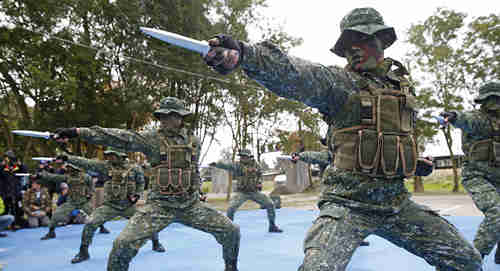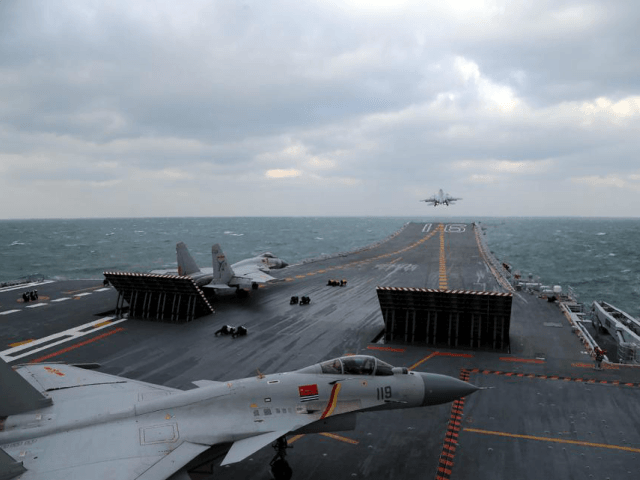This morning’s key headlines from GenerationalDynamics.com
- China says that its military exercises are intended to threaten Taiwan
- Taiwan, in cooperation with the U.S., strengthens defenses against China
China says that its military exercises are intended to threaten Taiwan

Taiwan’s frogmen Marines perform close combat drills just a few kilometers from mainland China on the outlying island of Kinmen, Taiwan (AP)
Last week, China conducted an “innovative joint operation” where Chinese warplanes flew in opposite directions around Taiwan. New Su-35 fighter jets flew with H-6K strategic bombers south of Taiwan, and J-11 fights flew with KJ-200 early warning aircraft north of Taiwan. These operations involved two theatre commands for exercises that involved early warning systems, detection and assaults.
China’s government said Wednesday that the country’s military exercises around Taiwan are intended as a direct threat to Taiwan, following any moves toward independence. According to the Chinese government spokesman:
It is a strong warning to Taiwan independence separatist forces and their activities. It demonstrates our determination and capabilities to safeguard national sovereignty and territorial integrity.
[China has the] firm will, full confidence and sufficient capabilities to block moves toward Taiwan’s formal independence.
China has conducted frequent missions by air force fighters, bombers, and surveillance planes to circle Taiwan. Also, China has repeated sailed its sole operating aircraft carrier through the Taiwan Strait.
China is using a “carrot and stick” to deal with Taiwan. The “carrot” is that China is introducing 31 “preferential policies” for Taiwan, in the fields of legal rights, education, culture, and tourism, with the objective of charming the Taiwanese people by improving their lives. China is making it easy for Taiwanese businesses to borrow money and invest in high-tech enterprises on the mainland. China has provided internships and jobs for nearly 9,000 Taiwanese youth as of the end of 2017.
Perhaps most important, Taiwanese entrepreneurs and businessmen who are complaining about low pay and Taiwan are being offered higher wages and bigger markets on mainland China, resulting in a “brain drain” in Taiwan.
The “stick” is a Chinese invasion of Taiwan. Military experts say the balance of power between Taiwan and mainland China has now shifted decisively in the mainland’s favor, and they would overwhelm Taiwan unless US forces quickly came to Taiwan’s rescue. The United States is bound by law to provide Taiwan with the means to defend itself, but it is unclear whether the U.S. would take military action to defend Taiwan, and have an all-out war with China. South China Morning Post (Hong Kong) and AP and South China Morning Post and Xinhua and Reuters (21-Apr) and Reuters (24-Apr)
Taiwan, in cooperation with the U.S., strengthens defenses against China
Last week, for the first time, the annual Taiwan-U.S. Defense Business Forum was hosted in Taiwan, in order to “bring together U.S. and Taiwan companies to discuss granular challenges of bilateral cooperation in the defense industry supply chain.” The objective is to allow business executives and government officials from both countries to discuss defense cooperation in the shipbuilding, cybersecurity, and aerospace industries.
China, as usual, reacted with fury. Zhu Songling, a professor at the Institute of Taiwan Studies in Beijing Union University, warned that the event was dangerous and could lead to war:
The deepening US defense cooperation with Taiwan is an act of gross interference in China’s domestic affairs. It’s a very serious matter for the Chinese mainland. Further moves that promote concrete military exchanges will invoke a strong response from the mainland, even prompt the Chinese mainland to use non-peaceful means to resolve the Taiwan question.
A particular worry for the Taiwanese are China’s J-20 stealth fighter jets. These are not detectable using ordinary radar, and if J-20s were among the warplanes circling Taiwan last week, Taiwan’s military was not aware of it.
Taiwan is developing – for operational testing this year, and with mass production and deployment expected by 2020 – the P01-180514-pic1BA mobile passive radar system developed by the island’s Chungshan Institute of Science and Technology. This system would be able to detect, track and lock on to targets at long range.
Finally, Taiwan scheduled its own military drills late in April. These drills simulate repelling an invading force, emergency repairs of a major airbase and using civilian-operated drones as part of military exercises. The descriptions of these drills do not mention China, but instead refer to “offensive forces invading Taiwan.” The Diplomat and Global Times (Beijing, 8-May) and Asia Times
Related Articles:
- Trump administration approves selling submarine technology to Taiwan (08-Apr-2018)
- Taiwan’s president responds to military threats from China (01-Jan-2017)
- China demands new Taiwan leader explicitly affirm that Taiwan is part of China (26-May-2016)
- Taiwan’s pro-independence party wins historic presidential election (17-Jan-2016)
- China’s ‘Anti-secession law’ provokes massive Taiwan riots (27-Mar-2005)
KEYS: Generational Dynamics, Taiwan, China, Taiwan-U.S. Defense Business Forum, Zhu Songling
Permanent web link to this article
Receive daily World View columns by e-mail

COMMENTS
Please let us know if you're having issues with commenting.